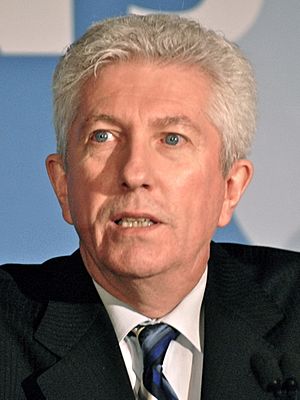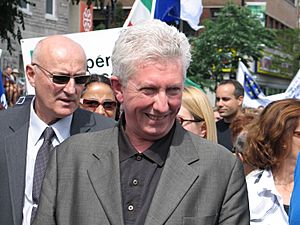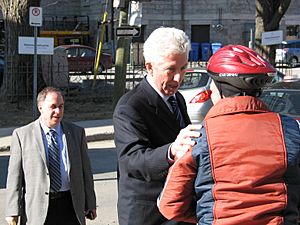Gilles Duceppe facts for kids
Quick facts for kids
Gilles Duceppe
|
|
|---|---|

Duceppe in 2011
|
|
| Leader of the Opposition | |
| In office March 15, 1997 – June 1, 1997 |
|
| Preceded by | Michel Gauthier |
| Succeeded by | Preston Manning |
| In office January 16, 1996 – February 17, 1996 |
|
| Preceded by | Lucien Bouchard |
| Succeeded by | Michel Gauthier |
| Leader of the Bloc Québécois | |
| In office June 10, 2015 – October 22, 2015 |
|
| Preceded by | Mario Beaulieu |
| Succeeded by | Rhéal Fortin (interim) |
| In office March 15, 1997 – May 2, 2011 |
|
| Preceded by | Michel Gauthier |
| Succeeded by | Vivian Barbot (interim) |
| In office January 16, 1996 – February 17, 1996 (interim) |
|
| Preceded by | Lucien Bouchard |
| Succeeded by | Michel Gauthier |
| Member of the Canadian Parliament for Laurier—Sainte-Marie |
|
| In office August 13, 1990 – May 2, 2011 |
|
| Preceded by | Jean-Claude Malépart |
| Succeeded by | Hélène Laverdière |
| Personal details | |
| Born | July 22, 1947 Montreal, Quebec, Canada |
| Political party | Bloc Québécois |
| Other political affiliations |
Workers' Communist Party (formerly) Independent (1990–1993) |
| Spouse | Yolande Brunelle |
| Children | Amélie, Alexis |
| Profession |
|
| Signature | |
Gilles Duceppe (born July 22, 1947) is a Canadian politician who is now retired. He was a strong supporter of the Quebec sovereignty movement, which aims for Quebec to become an independent country. Duceppe was also the former leader of a federal political party called the Bloc Québécois.
He served as a Member of Parliament (MP) in Canada's government for more than 20 years. He led the Bloc Québécois for a total of 15 years, across three different periods: in 1996, from 1997 to 2011, and again in 2015. For a short time, from March to June 1997, he was the Leader of the Official Opposition in the Parliament of Canada. This means he was the main leader of the party with the second-most seats in Parliament.
Duceppe stepped down as party leader after the 2011 election. In that election, he lost his own seat in Parliament, and his party faced a big defeat. However, he returned four years later to lead the party in the 2015 election. After losing his seat again, he resigned once more.
Contents
Early Life and Education
Gilles Duceppe was born in Montreal, Quebec, on July 22, 1947. His father, Jean Duceppe, was a well-known actor. His mother was Hélène Rowley. Duceppe once made a joke about his British family roots, saying he was "a bloke who turned Bloc."
Duceppe became interested in Quebec's independence movement when he was about 20 years old. He was inspired by René Lévesque, a key figure in Quebec politics, and the group called the Mouvement Souveraineté-Association.
He finished high school at Collège Mont-Saint-Louis. Later, he studied political science at the Université de Montréal. While there, he became the general manager of the school's newspaper, Quartier Latin. In his younger years, he was part of the Workers' Communist Party of Canada (WCP) for about three years. Duceppe later said that joining this group was a mistake he made while looking for clear answers in life.
Early Career Path
Before becoming a Member of Parliament, Duceppe worked in different jobs. He was a hospital orderly, helping patients. Later, he became a negotiator for trade unions, which are groups that represent workers.
In 1968, he became the vice-president of a student union called the Union générale des étudiants du Québec. In 1970, he managed the student newspaper at the Université de Montréal. He started working in community and union settings in 1972. He helped organize a citizens' committee in Hochelaga-Maisonneuve. In 1977, he became a representative for employees at the Royal Victoria Hospital. By 1981, he was a union organizer for the Confédération des syndicats nationaux (Confederation of National Trade Unions), where he became a negotiator in 1986.
Time in Parliament
First Election Win
In 1990, Gilles Duceppe was elected to the House of Commons of Canada. This happened during a special election called a by-election in the area of Laurier—Sainte-Marie in eastern Montreal. He won against Denis Coderre from the Liberal Party, who later became the Mayor of Montreal. Duceppe was easily re-elected in every election from 1993 to 2008.
Serving as an MP
When Duceppe was first elected, he sat as an independent Member of Parliament. This was because the Bloc Québécois had not yet been officially recognized as a political party by Elections Canada. Other Bloc MPs had previously switched from other parties. Duceppe's victory was important because it showed for the first time that the Bloc Québécois had real support from voters in Quebec and could win elections. Before this, many experts thought the Bloc would not be popular with ordinary people in Quebec.
Leading the Bloc Québécois
In 1996, Lucien Bouchard stepped down as the leader of the Bloc Québécois. He left to become the leader of the Parti Québécois, a provincial party in Quebec. Duceppe then served as the temporary leader of the Bloc. Later that year, Michel Gauthier became the official leader. However, Gauthier was not very well-known and his leadership was seen as weak. Because of this, the party asked him to step down in 1997. Duceppe then won the leadership race and became the official leader of the Bloc Québécois. He also became the Leader of the Opposition in Parliament.
In the 1997 general election, the Bloc Québécois lost its status as the official opposition. They fell to third place in the House of Commons, behind the Reform Party. During that election campaign, Duceppe visited a cheese factory. A photo of him wearing a hairnet that looked like a shower cap was widely made fun of on Canadian television.
The Bloc lost more support in the 2000 election, winning only 38 seats. During this time, some critics said Duceppe was not a very effective campaigner. However, no one seriously challenged his leadership.
When Jean Chrétien stepped down as Prime Minister and Paul Martin took over, the Bloc's popularity grew a lot. This was especially true after the sponsorship scandal became public. Duceppe strongly criticized the Liberal government for misusing public money meant for advertising in Quebec. During the national election debates, Duceppe clearly explained the Bloc Québécois' policies. He also criticized the promises made by other party leaders. Both French and English media said he was the best speaker in the debates. In the 2004 election, Duceppe's Bloc won 54 seats in Parliament. This was the same number they won in their first big success in 1993. Martin's Liberals, meanwhile, won fewer seats and formed a minority government.
After Chrétén left, Duceppe became the longest-serving leader of a major political party in Canada. With the Bloc's recent success and his good performance as leader, people wondered if Duceppe would try to become the leader of the Parti Québécois. This speculation grew when Bernard Landry stepped down as the PQ leader in June 2005. On June 13, 2005, Duceppe announced that he would not run for the leadership of the PQ.
Duceppe's Bloc Québécois, along with Stephen Harper's Conservatives and Jack Layton's NDP, worked together in November 2005. They passed a motion that showed they had no confidence in Prime Minister Paul Martin's Liberal government. This led to the 2006 federal election. Many people within the Bloc believed that Duceppe's popularity and the Liberal Party's unpopularity in Quebec would help the Bloc win more than half of the votes in Quebec. Many Quebec separatists hoped that a strong performance by the Bloc in 2006 would boost the independence movement. They thought it might even lead to a new vote on Quebec becoming a country. However, the Bloc's share of the popular vote stayed below 43%, and they won only 51 seats. The Conservatives gained seats in Quebec and Ontario, which allowed them to form a minority government with Harper as Prime Minister. The results of the election raised questions about how much support there truly was for Quebec independence.
In the March 26, 2007 Quebec provincial election, the Parti Québécois ended up in third place in the National Assembly of Quebec. They were behind both the ruling Quebec Liberal Party and the opposition Action démocratique du Québec. After this disappointing result, the PQ leader, André Boisclair, announced he would resign in May 2007. Duceppe confirmed on May 11, 2007, that he would seek the PQ leadership, but he withdrew from the race the next day. After withdrawing, Duceppe announced he would support Pauline Marois, who had run for leadership twice before.
2008 Federal Election
In the 2008 federal election, Duceppe led the Bloc Québécois to win 49 seats. This was one more than their previous 48 seats. However, the Bloc's share of the popular vote dropped again, to 38%. This was their lowest result since 1997. After the election, the Liberals and NDP tried to form a coalition government with support from the Bloc Québécois. This would have removed the minority Conservative government from power. However, the Governor General paused Parliament before the vote could happen. After this pause, the Liberals changed leaders and decided not to support the coalition. They instead supported the Conservatives' budget. But Duceppe's Bloc and Jack Layton's NDP remained committed to voting against the Conservatives.
2011 Election and Resignation
In 2011, the Bloc Québécois worked with the Liberals and NDP to declare that the Conservative government was in contempt of Parliament. This happened after all three opposition parties said they would not accept the Conservatives' budget. This led Prime Minister Harper to ask for Parliament to be dissolved, which meant a new election would be held. The Bloc demanded $5 billion for Quebec, including money for damages from the January 1998 North American ice storm and $175 million for a new hockey arena. The Conservatives completely rejected these demands.
In the 2011 federal election, the Bloc lost 43 of their 47 seats. This included many seats they had held since their first big win in 1993. They were left with only four Members of Parliament and lost their official party status. Much of their support went to the NDP, who moved from fourth place to second place and became the Official Opposition. The NDP won 59 seats in Quebec, including many areas that were traditionally strongholds for the Bloc. The NDP, which had only one MP in Quebec before the election, gained a lot of support in the last weeks of the campaign. This was due to their leader Jack Layton's popular personality and his policies. People felt that while the Bloc had defended Quebec's interests for years, the idea of Quebec becoming independent was "no longer very relevant." Duceppe himself lost his seat to NDP candidate Hélène Laverdière by 5,400 votes.
Duceppe accepted responsibility for the Bloc's big defeat. He announced he would resign as Bloc leader soon after the results were clear. However, he remained determined, promising not to rest "until Quebec becomes a country."
Spending Questions
In January 2012, Duceppe was accused of using money meant for his parliamentary office to pay the Bloc Québécois' general manager for seven years. Duceppe denied doing anything wrong when he spoke to the House of Commons Board of Internal Economy in February. In November 2012, the board found that Duceppe had misused funds. However, the board could not take disciplinary action because the money was spent before the rules about this issue were changed.
Retirement and Brief Return
After leaving Parliament, Duceppe worked as a political analyst, sharing his thoughts on current events. In 2014, he spoke out against comments made by the newly elected Bloc leader, Mario Beaulieu. Beaulieu seemed to criticize Duceppe's approach to achieving independence, calling it defeatist.
After two more years of declining support and internal disagreements within the party, it was announced on June 10, 2015, that Duceppe would return to lead the Bloc into the election campaign. His successor, Mario Beaulieu, would step down as leader but remain the party president. The party leaders agreed on June 9, 2015, to separate the roles of president and party leader to make Duceppe's return easier. These changes were officially approved by the party's general council on July 1.
On August 1, 2015, it was reported that Duceppe had decided to run again in his former riding of Laurier-Sainte-Marie in the upcoming federal election. He announced this shortly after the election was officially called on August 2. In the October 19, 2015 election, he led his party to win 10 seats, up from two. However, Duceppe personally lost his own seat again. He announced his resignation as leader a few days later.
Duceppe's son, Alexis Brunelle-Duceppe, was elected to Parliament in the 2019 federal election. In 2024, he commented on Prime Minister Trudeau, saying the Liberals "don't have another choice" for leader before the next federal election.
Images for kids
See also
 In Spanish: Gilles Duceppe para niños
In Spanish: Gilles Duceppe para niños
 | James Van Der Zee |
 | Alma Thomas |
 | Ellis Wilson |
 | Margaret Taylor-Burroughs |



